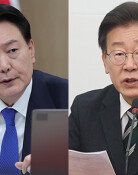Seoul seeks to mobilize international collaboration
Seoul seeks to mobilize international collaboration
Posted September. 19, 2016 07:14,
Updated September. 19, 2016 07:46
Having agonized over how to resolve the North Korean nuclear issue during the Chuseok holiday, South Korean President Park Geun-hye is reportedly planning to seek to mobilize international consensus to ensure China will take part in sanctions against North Korea. The president is to use an indirect strategy because direct communications with Beijing are limited due to the planned deployment of the terminal high-altitude area defense (THAAD) system in South Korea.
“While being debriefed about situation in the North and moves in the international community during the Chuseok holiday, President Park agonized over ways to resolve the North Korean nuclear issue,” a source at the presidential office said on Sunday. “The president considers reinforced international cooperation to be a practical solution.” President Park is expected to announce a message on the North Korean nuclear issue at a meeting of senior presidential secretaries this week.
Presently, it is not easy to arrange a telephone call between President Park and Chinese President Xi Jinping. The two leaders held a telephone call on Feb. 5, about a month after the North’s fourth nuclear test on Jan. 6, but both countries are reportedly not very enthusiastic about a call this time. “Since they held sufficient dialogue at the South Korea-China summit on Sept. 5, they are well aware of each other’s thoughts,” a presidential aide said. “China also has many concerns over the North Korean nuclear issue, and we need to seriously think whether a call between the two leaders is desirable.”
However, analysts say that the South Korean government is reluctant because it internally concerned about possible negative effect when Seoul is rejected by Beijing after seeking a call between the two leaders and that THAAD dispute resurfaces. After calls between their leaders on Sept. 9, the day when Pyongyang conducted its fifth nuclear test, South Korea and the U.S. and South Korea and Japan held calls between their leaders, followed by talks between their chief negotiators for the six-party talks on North Korea’s denuclearization (Sept. 12-13). Also, a meeting among foreign ministers of South Korea, the U.S. and Japan is taking place on Monday, but only a call among the chief negotiators for the six-party talks (Sept. 10) and a call among foreign ministers happened (Sept. 13) between South Korea and China.
China, which had been lukewarm to sanctions against North Korea, changed its course to join U.N. sanctions after Pyongyang’s fourth nuclear test largely because the North made additional provocation by firing long-range missiles (Feb. 7). However, unlike the situation at the time when aftereffects of President Park’s summit diplomacy through her attendance at the Chinese military’s parade at the Tiananmen fortress were remaining, tension over THAAD between Seoul and Beijing has yet to be abated this time. After the foreign ministerial meeting between South Korea and China on Sept. 13, Seoul said that the two countries exchanged basic stances on the deployment of THAAD, but China’s state-run Xinhua News Agency reported Chinese Foreign Minister Wang Yi had expressed opposition to THAAD deployment, by quoting him as saying “Countries concerned should refrain from taking additional acts that could elevate tension.”
The South Korean government considers the U.N. General Assembly on Saturday through this Thursday as an opportunity to mobilize international consensus against the North’s fifth nuclear test. Foreign Minister Yun Byung-se is seeking to hold bilateral meetings with foreign ministers of at least 15 countries including member states of the U.N. Security Council. However, Minister Yun has not been able to set up meetings with China and Russia, which are key parties to the issue. Another situation that causes concern is calling of the U.N. Security Council due to the U.S. military’s accidental bombing in Syria on Saturday, which disperses focus and sparks conflict between the U.S. and Russia, which in turn could dampen concentration on the North Korean nuclear issue.
조숭호기자 shcho@donga.com · 장택동 기자will71@donga.com







